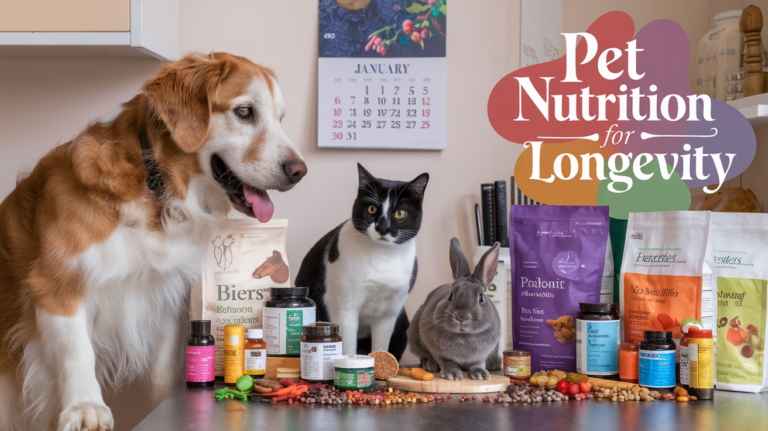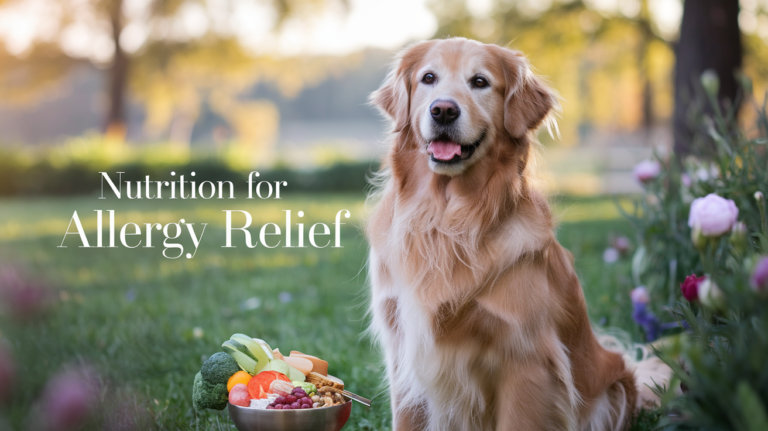Do you consider your pet more than just a pet? 🐾 For many millions of pet owners the answer is undoubtedly “yes”. Pets hold a special place in our heart; part of the family, who we want to treat the same as our human loved ones.
The bond between humans and their pets is something magical—infused with love, trust, and companionship. We all want to do the best for our pets as fur parents. And one of the best ways to do that? Nutrition. The right food will not only support their physical health but also build the emotional connection between you.
In the era of personalizing everything, this gave me pause to think about how tailored nutrition can change the life of your pet as well as your bond with your pet. Just as we’ve discovered that one-size-fits-all diets are ineffective for humans, so too embarrassingly we’ve learned they leave our four-legged companions in need as well. Whether you have a senior dog with joint problems, a high-energy puppy, or even a cat with food sensitivities, personalized nutrition might just be the key to unlocking their max potential for health and happiness.
Take your time, read each sentence of this article, relish it, and learn about tailored pet nutrition. From the science of metabolomics to functional nutrition, we’ll uncover the secrets to a healthier, happier pet — and a more rewarding relationship for both of you. 🐶❤️🐱
The Connection Between Diet, Behavior, and Emotional Bonding

How Nutrition Affects Your Pet’s Behavior
Believe it or not, what your pet consumes influence a lot to his behavior. Some nutrients play an important role in cater for the brain function and emotional stability. Omega-3 fatty acids are a good example; they’re great for cognitive health and can actually reduce anxiety. Then there’s tryptophan (found in protein), which aids serotonin production, the “feel-good” neurotransmitter, which regulates mood and behavior. And blood sugar levels should not be overlooked. If they’re everywhere at once, then your pet could be hyper one minute and sluggish the next. Source: Revelation Pets
Real-Life Cases: How Diet Changes Improved Behavior
Studies find that making small modifications to a pet’s diet can have a significant impact on its behavior. For example, omega-3s have been associated with reducing anxiety and improving mood in dogs when the fatty acids are part of their diet. And when pets are not receiving adequate essential nutrients — thiamine (Vitamin B1), for example, contributes to brain function — it can contribute to neurological problems and even behavior issues. Source: Ruff Academy. Source: Ruff Academy
The food we give our pets has a huge impact on their mood and behavior. Nutritional biochemistry shows that certain nutrients affect neurotransmitter production in the brain. For example, tryptophan, an essential amino acid that is present in many protein-rich foods, is a precursor to serotonin, a neurotransmitter commonly referred to as the “feel-good” neurotransmitter.
| Nutrient | Role in Mood/Behavior | Food Sources |
|---|---|---|
| Tryptophan | Serotonin production | Turkey, chicken, fish |
| Omega-3 fatty acids | Brain function, anxiety reduction | Salmon, sardines, flaxseed |
| B-vitamins | Stress management, energy production | Liver, eggs, leafy greens |
Proper nutrition can lead to:
- Improved cognitive function
- Reduced anxiety and aggression
- Enhanced overall well-being
Personalized Nutrition: The Path to a Healthier, Happier Pet

So now that we’ve talked about how diet and behavior affect the bonds we form, let’s move on to the topic of personalized nutrition, or how your dog could be happier and healthier with a little thought and finesse on your part.
Every Pet Has Unique Dietary Needs
All pets are unique, just as people are. Their dietary needs vary based on factors such as age, breed, activity level, and general health status. Puppies and kittens, specifically, require protein- and fat-rich diets, since they’re growing so rapidly. Older pets, however, often require food that supports weight management and joint health.
Source: Summit Animal Hospital
Tailored nutritional guidance based on an individual pet’s age, breed, metabolism, and activity level. It takes into account that each pet has its own dietary requirements, rather than adopting a cookie-cutter attitude. This is where personalized nutrition comes in, as it can provide the right balance of nutrients to optimize health outcomes, prevent disease and enhance the overall quality of life for our fur babies.
Why a Personalized Meal Plan Matters
You can do miracles for your pet with a diet tailored to it. It aids in weight control, minimizes allergies, and provides more energy. And when you spend the time to make sure you have what works best for your pet, you’re telling them you love them. And they feel it! Mealtime is something they can’t wait for, adding even more to your bond.
Personalized nutrition differs significantly from standard commercial pet food in several ways:
| Aspect | Standard Pet Food | Personalized Nutrition |
|---|---|---|
| Formulation | Generic recipes for broad categories | Tailored to individual pet needs |
| Nutrient balance | Average requirements for species/life stage | Precise ratios based on specific factors |
| Ingredient quality | Varies widely | Often higher quality, human-grade |
| Health focus | General maintenance | Targeted support for specific conditions |
| Customization | Limited options | Highly adaptable to pet’s changing needs |
The Power of Personalization in Preventing and Managing Health Issues
Personalized nutrition plays a crucial role in both prevention and management of health problems:
- Prevention:
- Reduces risk of obesity
- Minimizes chances of developing heart disease
- Supports joint health to prevent mobility issues
- Management:
- Addresses existing health conditions through precise nutritional interventions
- Helps control symptoms of chronic diseases
- Potentially reduces the need for medication in some cases
By leveraging metabolomics and other advanced diagnostic tools, personalized nutrition can identify individual nutrient needs before symptoms appear, allowing for proactive health management.
Steps to Create a Tailored Nutrition Plan
Looking to customize your pet’s food? Begin with a consultation from a vet or pet nutritionist to determine what they should be eating. Monitor their reactions to their food and adjust accordingly. There are even pet food companies that provide customized meal plans, so it has never been easier to feed your pet the food they need. Source: Pet Food Industry
Personalized nutrition takes into account various factors to create optimal meal plans:
- Age: Senior dogs may require lower-calorie diets to manage weight and support joint health
- Breed: High-energy breeds benefit from protein-rich diets to sustain activity levels
- Metabolism: Customized portions and nutrient ratios based on individual metabolic rates
- Activity level: Adjusting calorie intake to match exercise requirements
These tailored meal plans can address specific health issues, such as food allergies or chronic conditions like diabetes, by providing targeted dietary solutions.
As we move forward, we’ll explore how metabolomics serves as a key tool in unlocking your pet’s unique nutritional blueprint, further enhancing our ability to provide truly personalized nutrition.
Metabolomics: Unlocking Your Pet’s Unique Nutritional Blueprint

With that, let’s take a look at the science behind creating a tailored approach to your pet’s diet.
What Is Metabolomics and Why It Matters for Your Pet
Metabolomics is the study of the body’s real-time nutritional status by analyzing its metabolites. The process, which is more complex than generalist pet nutrition guidelines, analyses blood, urine and stool samples to ascertain precise requirements of amino acids, vitamins and minerals. This awareness helps us better tailor a nutritional strategy based on your pet’s unique metabolic profile. Source: Purina Institute
How Metabolomics Helps with Pet Nutrition
Metabolomic studies have been used to discover nutrient imbalances in pets. For example, studies have demonstrated how based on metabolic changes in some dogs with specific health concerns, veterinarians can formulate more tailored diets. But, rather than playing guessing games, pet owners can find science-based solutions that can inform choices about nutrition. Source: PMC (NIH)
Factors influencing dietary requirements
Several factors play a crucial role in determining your pet’s dietary needs:
- Age
- Physiological status
- Activity level
- Existing health issues
These factors are part of what veterinarians call “The Circle of Nutrition,” which categorizes influencing elements into three main areas:
| Category | Examples | Management Strategies |
|---|---|---|
| Animal-specific | Nutrient-sensitive disorders, adverse food reactions, obesity | Tailored diets addressing specific nutrient limitations |
| Diet-specific | Diet-induced disorders, nutrient imbalances, spoilage | Appropriate diets meeting the animal’s needs |
| Feeding management | Over/underfeeding, excessive treat usage, poor husbandry | Effective communication with pet owners for optimal management |
Common health issues addressed by personalized nutrition
Personalized nutrition can help address various health concerns:
- Obesity
- Organ-specific diseases
- Food intolerances
- Digestive inefficiencies
- Metabolic disorders
Using Metabolomics to Tailor Your Pet’s Diet
By leveraging metabolomics, we can:
- Identify food intolerances and digestive inefficiencies
- Conduct gut microbiome testing to select appropriate fiber, probiotics, and prebiotics
- Evaluate the nutritional completeness of the existing diet
- Determine appropriate food quantities
- Assess the impact of treats or human foods on caloric intake
The Future: Precision Diets Based on Your Pet’s Metabolism
With new technology, we might soon be able to regularly track a pet’s metabolic health and adjust their diet in real time. Imagine a future where your pet gets exactly what they need, when they need it—helping them live a longer, healthier life. Source: Metabolon
This holistic view guarantees that each animal’s specific requirements and contexts are taken into account for a more complete nutritional assessment. With metabolomic analysis, the diet is regularly monitored and adjusted; this means better health for your pet, whether we are talking about life expectancy or lifespan, and your bond with the pet gets stronger.
Next, we will discuss functional and orthomolecular nutrition and its place in personalized pet diets, expanding on the groundwork laid by metabolomics to help further enrich your pet’s health.
The Role of Functional & Orthomolecular Nutrition in Personalized Pet Diets

Functional Nutrition: Food as Medicine
Functional Nutrition is a holistic approach to pet health which sees food as a powerful medicine for prevention and healing. Better immune health, joint function, and energy levels are just a few ways bioavailable, whole-food nutrients can improve your pet’s diet.
This method emphasizes the use of vitamins, minerals, and other natural molecules to return to and sustain optimal well-being. For pets, this means employing targeted nutrition to prevent disease and help promote overall health.
This incorporates adaptogens and functional foods, which are critical components of this approach:
- Turmeric: A potent anti-inflammatory agent
- Mushrooms: Powerful immune modulators
- Choline-rich foods: Essential for cognitive support
| Functional Food | Benefits | Recommended For |
|---|---|---|
| Turmeric | Reduces inflammation, supports joint health | Pets with arthritis or inflammatory conditions |
| Mushrooms | Boosts immune system, supports overall health | All pets, especially those with compromised immunity |
| Choline-rich foods | Enhances cognitive function, supports liver health | Senior pets, breeds prone to cognitive decline |
Orthomolecular Nutrition: Precision Supplementation
Orthomolecular nutrition goes a step beyond personalized pet food, using high-dose, active forms of vitamins to make those biochemical pathways operate at their peak. This kind of targeted approach can work wonders when treating certain health issues, in particular.
Here are some main components of orthomolecular nutrition:
- Use of methylated B vitamins for improved absorption
- Balancing minerals for optimal hydration, nerve function, and cardiovascular health
- Targeted supplementation based on individual pet needs
This method is further validated in real life, where senior dogs have shown impressive cognitive improvement via supplementation specific to their needs. This precise technique helps pet owners target particular health issues in extremely effective ways.
Functional Foods: More Than Just Nutrition
Some foods are more than simply calories; they are directly supportive of your pet’s health. They improve digestion — for example, take probiotics. Or omega-3s, which help keep their coat shiny and fight inflammation. Supplementation of functional foods to a pet’s diet can combat disease and also improve its quality of life.
Case Studies: How Targeted Nutrition Works
Orthomolecular vets have had excellent success using these nutrients to treat certain conditions like arthritis and skin problems. Some use high doses of vitamin C to aid immunity; some advocate glucosamine for joints, etc.’ It is possible the right nutrients can help!
Having covered functional and orthomolecular nutrition in personalized pet diets, lets look at how these approaches can strengthen the bond between you and your furry friend.
How Personalized Nutrition Strengthens the Human-Animal Bond

Having learned how functional and ortho-molecular nutrition fits into personalized diets for pets, we can discuss how to reap the benefits of this approach for the strengthening of the bond between you and your furry friend.
The Psychological Benefits of Personalizing Your Pet’s Diet
There are many psychological benefits to personalizing your pet’s nutrition that will strengthen the human-animal bond:
- Greater connection: Customizing your pet’s diet based on their health requirements can help you also be more in tune with their health and well-being.
- Advocacy: Being involved in your pet’s nutrition empowers you as an owner to advocate for your pet’s health and well-being.
- Improved play: As your pet begins to feel better, you will notice a healthy spurt of playfulness and energy — meaning more fun, quality time for you both!
- Studies have indicated that positive interactions between humans and animals can increase oxytocin levels between the two. This “love hormone” is essential for enhancing emotional attachment and promoting general health.
| Benefit | Human | Pet |
|---|---|---|
| Reduced stress | ✓ | ✓ |
| Improved mental well-being | ✓ | ✓ |
| Higher self-esteem | ✓ | N/A |
| Enhanced physical fitness | ✓ | ✓ |
Practical Steps to Get Started with Personalized Nutrition
To embark on your personalized pet nutrition journey, consider the following steps:
- Track your pet’s symptoms, diet, and energy levels:
- Keep a daily log of food intake
- Note any changes in behavior or health
- Monitor energy levels during different activities
- Recommended tests and evaluations:
- Metabolomic testing: This can provide insights into your pet’s unique nutritional needs
- Allergy testing: Identify potential food sensitivities or allergies
- Regular veterinary check-ups:
- Schedule routine visits for preventive care
- Discuss your pet’s nutrition plan with your veterinarian
- Implement a balanced diet:
- Consider preparing homemade meals under veterinary guidance
- Choose high-quality commercial foods tailored to your pet’s needs
By doing this, you are not only enhancing your pet’s health but also bonding with them. By offering personalized nutrition, you show your zesty love with a defense against a commercial excess that gives them life, health and happiness while yielding the amazing dividends of a long-lasting relationship.
Conclusion

Knowing how to provide your pet with the best nutrition possible is more than just feeding them; it’s about understanding your pet and their specific needs. Age, breed, medical history and lifestyle will allow you to create a customized nutritional program based on your pet’s specific needs. In addition to addressing immediate health issues, this approach is vital for preventing future health complications which can subsequently extend your pet’s life as well as create possible savings on veterinary bills.
This is only one aspect of the responsible pet ownership path that puts you on the right track to healthy pet companionship all the way through to customized nutrition. When used in concert with regular exercise, playtime, wellness care and grooming, it fast tracks to a comprehensive approach to your pet’s physical and mental well being. So take the time, put in the effort, and learn how you can better accommodate your pet’s needs; if you do, you’ll not only find their true nourishment — you’ll also be creating a richer, more fulfilling relationship between you and your pooch. Today is the day to begin this journey by meeting with your vet or a pet nutritionist, who can help you develop a plan just for your pet, and lay the groundwork for a lifetime of health and happiness — for you and your dog or cat.
After all, personalized nutrition isn’t just about finding the right food for your pet, it’s about knowing them. By learning how to support your pet’s health, you’re not only making their lives healthier, you’re gaining their trust and deepening the bond you share. So why not make the next leap? Speak to your vet or a pet nutrition specialist, explore bespoke nutrition and give your pet the best standard of living they can get!
References
Scientific Research on Diet and Behavior in Pets
Scientific Research on Diet and Behavior in Pets
- Impact of nutrition on canine behavior: current status and possible mechanisms – Cambridge Core
- Dietary effects on canine and feline behavior – Academia.edu
- New Study Reveals Link Between Owner Demographics And Canine Nutrition – Texas A&M Today
Metabolomics & Personalized Pet Nutrition
- Metabolomics – Purina Institute – Purina Institute
- Paving the Way to Precision Nutrition Through Metabolomics – Frontiers
- Metabolomics: Pioneering Personalized Nutrition – Qina
Functional & Orthomolecular Nutrition in Pets
- Nurturing Your Pet’s Gut Health with Natural Solutions – The Pet Nutritionist
- Nutritional Management of Obesity in Pets – The Pet Nutritionist
- Top Nutritional Trends for Pets in 2025: What You Need to Know – The Pet Nutritionist
Oxytocin & Human-Pet Bonding
- Dog’s Gaze at Its Owner Increases Owner’s Urinary Oxytocin During Social Interaction – Hormones and Behavior







